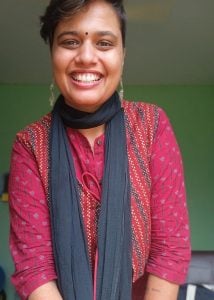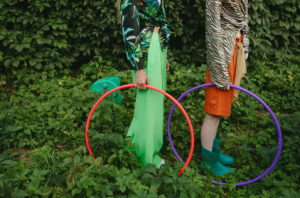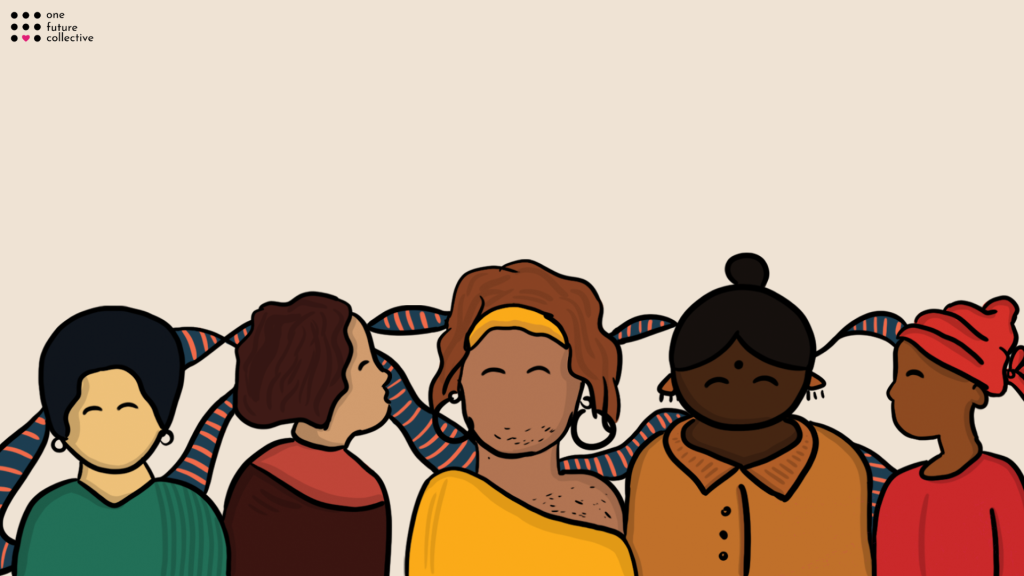Trigger Warnings– body shame, reference to self-harm.

Dearest,
I carry you and our experiences. From the moment you were conceived, I have never left you alone. I am more than a vessel made of bones, blood, and flesh. I, your body, am an ancient intelligence you inhabit. I run, crawl, claw, I play dead, and sometimes I shiver—anything that will help us survive.This is about thriving, not just surviving. Today, I want to talk about forming paths of healing for us through practices that allow you to listen to me mindfully. Practices like yoga or hula-hooping, that help you create a communication bridge between me and your mind.
Think back to when you first picked up a hula hoop. The voices in your head whispered that your soul’s home was ‘dirty’ or ‘wrong.’ Early on, we carried the burden of shame tied to being objectified. The idea that your body’s movements determined your safety took hold in your mind. In 10th grade, you began fasting to meet your mother’s inherited ideal of beauty, passed down like an heirloom. You longed to be skinny like your sister, hiding your changing body under baggy shirts. It felt like being a stuffed animal suffocated by shame.
After trying for the hundredth time, when the hoop finally stayed on the grooving waist for more than a minute, the exultation was surreal. Your mind went silent, as the hoop became my extension, as it spun, glided, and swerved with me. It helped us live through some of the most anxious nights. The freedom that we found — I was pretty and graceful, just the way I am. It was liberating for me to break from the labels of awkward, stiff, and clumsy. The journey with somatic practices can look different for different bodies, I am proud you found your joy and reclamation in hooping.
Our journey together has been challenging at times. When you started exploring the fluidity of your gender and sexuality, it felt isolating to be in a body that was used as evidence to confine you to the binary of man-woman. I am grateful that, over time, we found safe community spaces to explore the idea of gender beyond the body.
In the midst of the pandemic, we joined a queer-themed dance party curated by OFC via Zoom. It was a safe space to be myself without judgement, finding joy and freedom. Later, in Dharamkot, Himachal, we experienced an ecstatic dance ceremony that transcended language, culture, and boundaries. It was a sacred communion with strangers from around the world, where we expressed ourselves fully and formed a powerful connection.
Learning to love me, your body, need not be a lonely process. I am thinking of how you look into the mirror with so much love, smiling, your head echoing with all the nice things told to you about your body by your current or former partner. Also, sex can be an empowering somatic practice for queer individuals and women, isn’t it? It helps you reclaim agency, challenge objectification, and assert desires. Of course, it requires consent, communication, and safe spaces.
Meditate on how walking barefoot on the soil and doing seva in the community of Sadhana Forest relieved me of my chronic pain during the time you spent there. And now I am excited for the classes at the Queer Tango group that are about to begin. Finding safe community spaces has been integral to this healing journey.
While there is joy in my heart, my back is heavy with grief on some nights. I forgive you for all the times you ate your feelings for years or the nights you reached out for a blade— anything less painful than the emotional pain you were trying to escape. We live based on the awareness and information we have at a particular moment. Today, I am grateful as we walk the paths of healing. Will you join me in another post-dinner walk tonight?
Yours faithfully,
Body
P.S. – a poem.
Celebration

Do the waves celebrate
the return of the starfish
from the shore?
Does the sand grieve
the last throb of the dying jellyfish?
The art of celebration
is mastered through attention.
Hold that pebble against the skylight,
move your fingers
around its smoothed edges, smell the future
of the sand in its core,
before you put it in
your pocket.
Before you pocket celebration,
you have to be intimate
with the shore of grief —
walk barefoot feeling every grain,
crunch of shells
every crashing, gulls crying
salt and fish in the air.
When hurt washes over you
Do not metal your heart,
it will not save you
from being ravaged to rust.
Let your heart be salt, instead
crumble and dissolve,
Salt water heals wounds,
my grandmother said,
as she dipped a strip
of her old cotton saree
into the solution
and dabbed my bleeding knee
after I grazed it
falling from the bicycle.
Does the skin grieve a wound?
Does the skin celebrate a scab?
I threw out my shoes;
I walk plenty.
My pockets now,
rattle with the pebbles I love.
Rishita is an educator, poet, and tree-worshipper. She writes to document, explore, and survive. She lives to keep expanding her list of little, mundane joys like — the Tyndall effect through canopies; fresh, crisp, sun-dried laundry falling on the bed; watching people hold hands on the metro.
